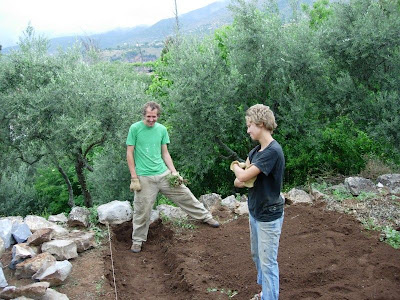
"WWOOF stands for world wide opportunities on organic farms. It is a network which started in the UK in 1971. Now it has become an international movement that is helping people share more sustainable ways of living. WWOOF is an exchange. In return for volunteer help, hosts offer food, accommodation and opportunities to learn about organic lifestyles. Volunteers usually stay 2-4 weeks and work an agreed number of hours per day. Work is in our organic garden and helping with the continuing renovation of buildings. All volunteers need to be members of the WWOOF organisation."
http://www.wwoof.org/
Recession-fighting backpackers take green vacations on European farms
By Jeannie Nuss (CP) - 2 days ago
source
SANTA EULALIA DEL MONTE, Spain — Backpackers pining for European adventure have discovered life on the farm, shovelling manure, feeding pigs and making butter as a recession-beating way to sate their wanderlust.
Their ticket to an earthy taste of the Old Continent is an innovative Web site that connects travellers with a network of organic farms stretching from Portugal to Turkey and around the world.
World Wide Opportunities on Organic Farms, an organization founded in Britain, has been around since 1971 but has lured many more volunteer farmhands in recent years as hard economic times forced people young and not so young to seek a cheap way to take a European vacation.

This year 15,700 of them are scattered across Europe getting their hands good and dirty, compared to 6,400 in 2004, WWOOF says. The number of hosts is up, too, roughly doubling to 2,240 in that same time span. The organization also offers farm stays in the Americas, Africa, the Middle East and the Asia-Pacific region.
For a few hours of work a day - other chores include milking goats, collecting honey and making compost - volunteers get a place to stay, fresh food to eat and a bargain.
"I didn't have enough money to stay on any other way," said Alex Mansfield, 21, a guitar-toting philosophy student from Massachusetts who traded in the city life of his study-abroad experience in Salamanca, Spain, for a few weeks on an isolated farm. "It gets expensive, having to eat and sleep under roofs."
Along with three other Americans and an Argentinean, Mansfield spent part of this summer on an ever-changing volunteer force at Centro Ammehula, a ghost hamlet transformed into an organic farm, tucked away on a craggy mountainside of Spain's northwest Galicia region.
The setting was scenic but the accommodations modest: several metal trailers and tents surrounding a bonfire area, all of it 14 kilometres from the nearest supermarket. But the volunteers, feasting on fresh lettuce and lip-staining strawberries from the farm, don't seem to mind.
"It feels so good to be right near the food you're about to cook," said former New York schoolteacher Talia Kahn-Kravis, 23, as she squirted milk from a goat's udder into a plastic bucket.
Like Kahn-Kravis, supporters of the slow food movement, which began in Italy as a backlash against fast food, are praising the return to the farms.
"It's one of the ways of recovering relationships with food," said Cinzia Scaffidi, director of the Slow Food Study Center in Italy.\

Centro Ammehula's owner, Martin Verfondern, 51, said WWOOF is not just about growing fresh produce. More importantly, he says, it fosters cultural understanding.
"WWOOF is the perfect anti-discrimination device," said the Dutchman born in Germany, who has lived on the Spanish farm for 11 years. "We have Germans and Israelis sitting at a table together without problems. It's a really great way of getting to know more of a country than only the national prejudices."
While Spain is seeing an increase in foreigners eager to take a stab at farming, it is hardly the only European nation attracting attention.
"It's a way to spend time in places without spending money," said WWOOFer Elliott Smith, 21, who has traveled to Italy and Belgium during vacations from an organic Beaujolais vineyard outside of Lyon, France. "Everybody wants to travel a bit and the big thing is to do it without going totally broke."
Aside from having a travel base camp among a crop of thin-skinned Gamay grapes, the linguistics student from Texas said his "farmer French ... increased tenfold."

Recent graduates and college students like Smith and Mansfield make up a significant portion of WWOOF's volunteers, although farmhands come from walks of life as varied as the chores they do, said Chemi Pena, spokesman for WWOOF in Spain.
"The profile of farms is really diverse," he said.
Julie Bateman, a mother of two and slow food advocate, packed up her 10-and 13-year-old children and left her home in Charleston, S.C., for a volunteer farming stint in Italy this summer.
"WWOOFing with the two children is certainly a twist on the normal travel and WWOOFing in general," said Bateman, 42.
For many volunteers, WWOOF is creating a class of green-thumbed do-gooders, more conscious of their carbon footprints.

"A lot of people maybe come here to do a cheap Eurotrip," said New York native Kahn-Kravis, as she picked strawberries. "But in reality, you can't do this without learning a bunch and having a more holistic approach to life."
If You Go...
WORLDWIDE OPPORTUNITIES ON ORGANIC FARMS: http://www.wwoof.org/. Food and lodging at an organic farm in exchange for volunteering to work at the farm. Annual registration fees vary by country, but are typically around $US30-35 (20-25 euros). Opportunities on every continent.
Copyright © 2009 The Canadian Press. All rights reserved.
http://lh6.ggpht.com/_GC4zlPbEl0o/SnG-4OVkVzI/AAAAAAAAG50/c9TlAEkgle0/s400/p1040831.jpg
--- end ---
Found this on youtube
source


No comments:
Post a Comment